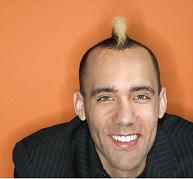How to Change Subconscious Cultural Assumptions
Posted by spritzophrenia on December 16, 2011
Tena kotou katoa. Ko Jonathan Elliot taku ingoa. Kia Ora Tatou! No reira, you just had a cultural experience reading those words. Most likely it was uncomfortable or confusing. Perhaps your cultural assumptions of how one should begin an English-language blog were challenged.
|
We all have subconscious cultural assumptions, things that we think and say and do which are so “obvious” and common sense that we never question them. There’s nothing wrong with this, it’s a universal condition of being human. What I want to know is, how do I overcome my cultural assumptions? I am using “culture” in a very broad sense. For example, I think men have a culture that is distinct from women. Much of it is based on our upbringing and society. Some of it is based on our purely physical differences. Because of the latter, no matter how we try, men will never truly understand the depths of being a woman – and vice versa. A subconscious cultural assumption could be another way of describing a Foucauldian “discourse”. A discourse, simply put, is what can be said at a particular point in history. In Madness and Civilization he asks why it was possible to talk about “madmen” in the 1800s and yet now we can only talk about those who are “mentally ill”. Foucault suggests that a new type of person, the madman was actually invented when we began to talk about people in a certain way. |

|
To illustrate a moment that questions cultural assumptions, let me quote from another of Foucault’s works, the opening to The Order of Things.
This book first arose out of a passage in Borges, out of the laughter that shattered, as I read the passage, all the familiar landmarks of my thought – our thought, the thought that bears the stamp of our age and our geography – breaking up all the ordered surfaces and all the planes with which we are accustomed to tame the wild profusion of existing things, and continuing long afterwards to disturb and threaten with collapse our age-old distinction between the Same and the Other. This passage quotes a ‘certain Chinese encyclopaedia’ in which it is written that ‘animals are divided into: (a) belonging to the Emperor, (b) embalmed, (c) tame, (d) sucking pigs, (e) sirens, (f) fabulous, (g) stray dogs, (h) included in the present classification, (i) frenzied, (j) innumerable, (k) drawn with a very fine camelhair brush, (1) et cetera, (m) having just broken the water pitcher, (n) that from a long way off look like flies’. In the wonderment of this taxonomy, the thing we apprehend in one great leap, the thing that, by means of the fable, is demonstrated as the exotic charm of another system of thought, is the limitation of our own, the stark impossibility of thinking that.
So, I know I have cultural assumptions. How can I be aware of them, and perhaps change them? Here’s
what’s worked for me:
1. Admit You Have Assumptions and be Willing to Change
If you read the above, understood it and agree, you are probably already in this mindset.
2. Expose Yourself to Other Cultures
In the late 90’s I did two overseas tours as a musician/DJ. One to the USA – this wasn’t much of a culture “shock” as the US mainly speaks English (and Spanish). But there were distinct differences – I will never forget the time in smalltown Georgia where I saw a Taco Bell with a sign outside: “Hamburgers 95c – Praise the Lord”.
A second DJ tour was through South-East Asia. In Malaysia we were hosted by local Chinese families. They took us out for an amazing 9 course dinner at a street restaurant. I had always found Chinese people to be a bit “different”, I had never really felt comfortable around them. After this I realised how warm and loving these families were, how deeply they loved their kids and how generous they were. It changed my life and I have always felt deep love for Chinese people ever since.
3. Give It Time
Challenging your cultural assumptions is easy. Changing them is hard. One thing I’ve learned is that you simply have to give it time, and expose yourself to different cultures again and again. For example, when I was a teenager I had heard of this “progressive rock” band called Yes. They were supposedly very good. I went out and bought two albums (on vinyl) to see if I liked them.
At first, I wasn’t impressed. The singer had a too-high falsetto, their lyrics were a poetic mess, and they spent most of their time in interminable guitar solos and fiddly-diddly keyboard solos (Rick Wakeman was in the band at the time). But I made myself listen again. And again. And by the third listen I was beginning to “get” the music, and enjoy it. Now, many years later I’m looking forward to seeing them live for the first time ever.
It was the same experience, but more extreme when I was first exposed to drum ‘n bass in 1996, and more recently to dubstep. Now I love them both. But it took time and a willingness to persevere to understand these musical subcultures.
What about you? What other ways can you think of to help us see through our subconscious cultural assumptions?
Respond
? What do you think?
Please subscribe (top left) 🙂
This post is part of the blogfest initiated by Carlos “Iggy” Shelton from Emerging Thought in Montana. If you enjoy this post, please check out the other links:
Blog Carnival: Subconscious Cultural Assumption by Emerging Thought in Montana.
Baked Ham for a Blog Carnival by Tripping and Stumbling While Following Jesus
Subconscious Cultural Assumption And “The Other” by Ben Currin on Facebook.
The Knobz | Don’t Give Me Culture This is a New Zealand post-punk song from 1981. It was written in protest of then-Prime Minister Rob Muldoon’s sales tax on records. He considered records not “cultural”.
3 Responses to “How to Change Subconscious Cultural Assumptions”
Sorry, the comment form is closed at this time.

SugarPop said
Great post, Jonathan 🙂
I wonder if you could translate your welcoming paragraph into English? I’d like to understand what you are saying, and I do like your specifically New Zealand touch opening, which I understand is also the custom in other Polynesian cultures.
Your comments about the “invention of the “madman” through language as described by Foucault. It made me think about “hysteria” and how that was the feminine form of madness, attributed to our body part the womb / uterus. Interesting that madness in women was attributed to a physical attribute, and in men to the mind… Something i will ponder and research some more, I think.
Your description of learning to like different music also reminded me of something that Sting talked about in the doco “My Musical Brain”. In his youth he began listening to Thaddeus Monk and just DID NOT get it. But he persevered and listened and listened and listened and then one day he “got it” and was able to understand and genuinely enjoy Monk’s music.
I’m looking forward to reading the other blogs involved in this festival 😀
Emily said
I love that Foucault quote. Though he made it up, the trickster, hehe. I found what Emily Bailey said, before exploring others peoples culture to explore your own. Foucault is very helpful in this area, as talks about endo and exo colonization. The world was colonised by a new regime which started in western countries peasants were moved off their land, they did not just simply migrate. This with factory life and the model it provided, resulted in the loss of traditional ways of life, of exteneded families, of crafts and community living.
Joe said
I can’t believe you haven’t seen yes “Live” yet. Also, the Knobz seem like Split-ENZ with “Attitude.” 🙂